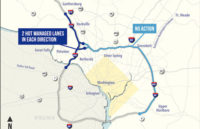Three of four infrastructure development teams shortlisted to submit proposals for the first phase of Maryland’s multibillion-dollar program to add privately-financed tolled managed lanes to portions of the I-495/Capital Beltway and the I-270 corridor outside Washington, D.C., have have submitted their technical and financial packages, but one led by Dragados USA has opted not to move forward.
Lead contractors for the three submitters include Halmar International LLC and Itinera S.p.A. for Accelerate MarylandExpress Partners team; Transurban and Macquarie for Accelerate Maryland Partners LLC; and Ferrovial Agroman US Corp for Capital Express Mobility Partners.
Dragados USA, which headed up Potomac Mobility Group as lead contractor, did not submit a bid. It has not commented publicly on its team’s decision not to pursue the project.
All teams were shortlisted last July by the Maryland Dept. of Transportation for the estimated $11-billion project.
Some P3 selection opponents and observers speculated about an accelerated proposal process around the Christmas-New Year holiday period, but Lisa B. Choplin, state DOT director of the I-270-Beltway P3 program, said teams were given draft RFP procurement details at the time of shortlisting, according to one local report.
The state confirmed Choplin's Dec. 31 retirement from the position she held since 2017 and from the agency, but did not comment on the timing nor announce her next position or successor. She had been involved in developing the procurement strategy for Maryland's $2.4-billion InterCounty Connector highway link, an innovative design-build project completed in 2011, and served as deputy executive director of the Design-Build Institute of America from 2015 to 2017.
The state DOT plans to select a preferred partner in early February, and negotiate a 50-year progressive public-private partnership concession to design, build, finance, operate and maintain up to four tolled managed lanes on a five-mile section of the Beltway, with the priority component being a new Potomac River crossing to connect with northern Virginia’s Express Lane system.
Concurrently, the team would add managed lanes to a 9-mile section of I-270 between the Beltway and I-370 in Gaithersburg.
Once those two sections are complete, the development team would continue the I-270/Beltway lanes expansion another 32 miles to I-70 in Frederick.
P3s Proceed Gingerly
The Beltway/I-270 managed lanes program has attracted controversy both for its potential impacts on environmentally-sensitive areas and adjacent neighborhoods, and Maryland’s rocky relationship with its P3 partner on the $2-billion Purple Line light-rail project, now more than two years behind schedule and in search of a new design-build team to complete major unfinished parts of the 16-mile, 22-station route through Montgomery and Prince George's counties.
Both projects are strongly backed by Gov. Larry Hogan (R), who chairs the three-person state public works oversight committee responsible for approving major infrastructure contracts, including those involving P3s.
Approval of the highway P3 is likely more than a year away, with the corridors’ federal and state environmental reviews and a potentially contentious permitting process still to be completed.
Opponents of the Beltway/I-270 project have cited concerns ranging from utility relocation issues to the effects of bridge construction on an environmentally sensitive island in the Potomac River. The U.S. Navy, which operates numerous facilities adjacent to the area of construction, including Walter Reed National Military Medical Center, has said it will not cede any land for the managed lanes project. There were more than 3,000 comments submitted in response to the project's recent environbmental impact statement
Meanwhile, the Purple Line’s development team has requested qualification submittals from design-build teams interested in taking over the light-rail line, which has been progressing at a substantially scaled-back pace since original contractor and investment partner Fluor Corp. left the project last summer in a dispute with MDOT over responsibility for delays and cost overruns.
Having reached a settlement with the state last fall, Purple Line Transit Partners, now made up of Meridiam and Star America, are leading the selection process with an eye toward having a new contractor in place by June, and resuming full-scale construction three months later.
Industry sources have speculated that selection of a new contractor will entail consideration of liability for the Fluor-led team’s work, and responsibility for costs above and beyond the original contract.
MDOT officials have not said what measures may be taken to make up time lost during the selection process, or whether it will add to the scope of agency-managed tasks that currently include bridge work, stormwater drainage, paving and utilities.





